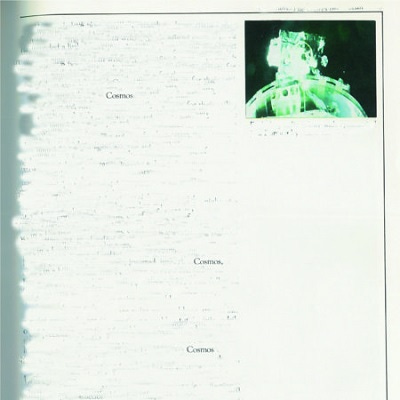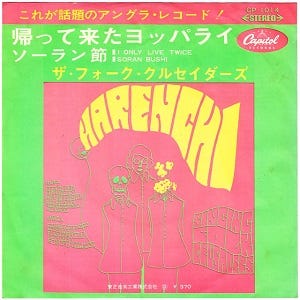Issue #2: Everything You Need to Know: The Voice
Three new singles, two experiments in voice, and one gun-slinging Yasutaka Nakata

Hello! Welcome to the second issue of This Side of Japan. And yes, you’re seeing right: that is Yasutaka Nakata in the air with two pistols in his hand.
Well, a video-game version of him anyway. The producer has recently participated in some, uh, interesting ventures outside of Perfume and Kyary Pamyu Pamyu—music for virtual idol Kizuna Ai and the winner of the Lawson Dream Artist Audition among others—and his latest involvement in the new Yakuza game might be the oddest. He collaborated with reggae group Shonan No Kaze for the game’s title track, “Ichibanka.” As a song, it’s paint-by-numbers Yasutaka Nakata—happy-go-lucky synths and loud brass over earth-shaking EDM drums—but hey, at least we get to see the super-producer fly into gun-slinging action.
If you’re looking for more of the silly and bizarre in Japanese pop, this edition’s entry for This Week In… should be up your alley. No goofs are found in our Album of the Week, but it does feature some neat experimental studio tricks.
I also published a cool project on Medium that I’ve been working with my friend Bacci for the past few months. The two of us talked all about Dempagumi.inc, their music and successes throughout the past decade. I commissioned this with them in hopes that we can create a nice intro to one of our favorite J-pop groups of the 2010s while celebrating their work. You can read that here! You can find Bacci talking about Japanese music (and other topics) on Twitter.
Oh, I didn’t mention this in the introductory post of the newsletter, but the issues that go out at the end of the month (like this one!) will include a Spotify playlist of every single (that’s available on Spotify) I found throughout the month. Here is January’s playlist! There’s still a week left, so I’ll still be adding songs to it.
On to the main program! Happy listening! You can also check out the archive of previous issues here.
Album of the Week

Nothing But Cosmos EP by Jimanica [Jeminic]
Release date: January 8, 2020
Recommended track: “Breath” | Listen to the album on Spotify
While Yu Ojima has lend his talents for a wide range of collaborators from World’s End Girlfriend to Etsuko Yakushimaru, he bangs out colorful glitch-funk in his main solo project Jimanica. He has favored more straightforward melodies in 2015’s pop-oriented Grand Age over the kitchen-sink electronics of his early works. For Nothing But the Cosmos, however, he dedicates a bulk of the EP to the meticulous studio experiments that’s only teased in his other albums.
“Dissolved,” featuring Miyu Hosoi, is a good look of what to expect from the EP. Hosoi’s glassy vocals provide much of the song’s texture while Ojima’s drum fills pin it with some sense of structure. Other highlights also focus on the voice as a key instrument. A section of “Flower” subtly pans cut-up pieces of Anna Yamada’s voice, which sets in the atmosphere as a chorale similar to a Julianna Barwick track. A synth jam in “Breath” gets interrupted by a heaving exhale reminiscent of Klein’s distorted hums.
Ojima grounds the EP with a couple tracks that tie back to his roots in case the experiments go a bit too far out. The synth excursion of “Top” continues the boldness of the vibrant pop pieces of Grand Age. The bubbling electro “Floating” is the loud, thrilling outlier in an otherwise quiet record. Assuring as those intermissions may be, Nothing But the Cosmos shines best when Ojima attempts to venture into a path less traveled.
Singles Club
“I Don’t Know” by Aikure [self-released]
Consider Aikure’s new single, Morning, as their fresh restart. The indie-rock band’s 2019 didn’t go smoothly as planned with the wide release of their live-show-only Idea of a Revolution EP put on indefinite hold. Despite the unforeseen circumstances, “I Don’t Know” from the new three-track release finds the band gracefully moving forward. Frontwoman Yukimi sweetly harmonizes over a laid-back pop-punk-ish guitar riff, and she sounds the most content when she embraces the great unknown in the chorus: “We don’t know/ what’s ahead of this path/ A world unseen/ A beautiful world,” she sings before the guitar scrawl takes her away.
Morning is out now. Listen to it on Spotify.
“Open It Up” by Awich [YENTOWN/bpm tokyo]
Awich continues to flex her skills as a pop chameleon by hopping on Carribbean dance-pop as well as house beats in her latest full-length, Kujaku. Her rap songs, though, are still her strongest suit, and her collaboration with Baauer is a highlight. The producer hands in a wonky beat made up of nothing but rumbling bass, noisy jingling and a squeaky baby coo. Awich takes advantage of the abundant space, spitting a zigzagging verse full of ego-boosting and verbal wordplay without breaking a sweat.
Kujaku is out now. Listen to it on Spotify.
“Tokkaten” by Sassya- [Diskunion]
For their split single with punk peers Vacant, Sassya- bring the woozy, angst-ridden post-hardcore that made last year’s Seikizui such a thrill. Frontman Satoru Iwakami channels Black Francis’s stammers in “Tokkaten” as he observes the aimlessness of the world around him: “always eat, work, sleep/ always living like a coward,” he barks in the second verse. The rest of the band chugs along the same start-stop figure, like they’re also trying to ignite some sort of spark. The pent-up energy eventually all combusts in the chorus with all of the noise and screams swirling together into a glorious mess.
Sassya- x Vacant Split CD is out now. Listen to it on Spotify.
This Week in 1968…

“Kaettekita Yopparai” by The Folk Crusaders [Capitol, 1967]
No. 1 during the weeks of Jan. 25 - Feb. 22, 1968 | Listen on YouTube
The second-ever single to make it to the top of the chart is a novelty song, and it’s the first out of many of its kind that we will encounter throughout Oricon history. But unlike, say, “Oyoge! Taiyaki-kun,” The Folk Crusaders do not promote a character or product; neither is it a vanity music release from a celebrity. “Kaettekita Yopparai” is simply weird enough for its strangeness to become its own pop appeal, and it’s maybe the most odd-sounding number-one we’ll cover.
“Kaettekita Yopparai” (“The Drunk Who Came Back”) tells a goofy story of a drunkard who arrives to heaven after a drunk-driving accident, but God eventually kicks him out because he drinks too much. While the steady strums of the acoustic guitar provide an easy-going feel like background music for an audiobook reading, the post-production manipulations of the vocals give the tale an animated touch. The main character’s voice is pitched up to a squeak, and God’s voice booms with thunderous echo as he hollers to the drunkard to never enter his domain again.
The studio techniques recall the experimental music that caught the Beatles’ interests and later inspire some cuts in the White Album that same year. (The Folk Crusaders later released a single under the pseudonym The Zootorubee, an amalgam of The Beatles in Japanese.) The jokey story at the forefront might suggest otherwise, but the elements of “Yopparai” from the warped voices, the fumbling pianos and a random sample of “Fur Elise” could pass as musique concrete. While the band introduced folk to the Japanese mainstream through other singles, it was this weird one-off that the public latched onto the most.
The next issue is out Feb. 5. You can view the archive of previous issues of This Side of Japan here.


